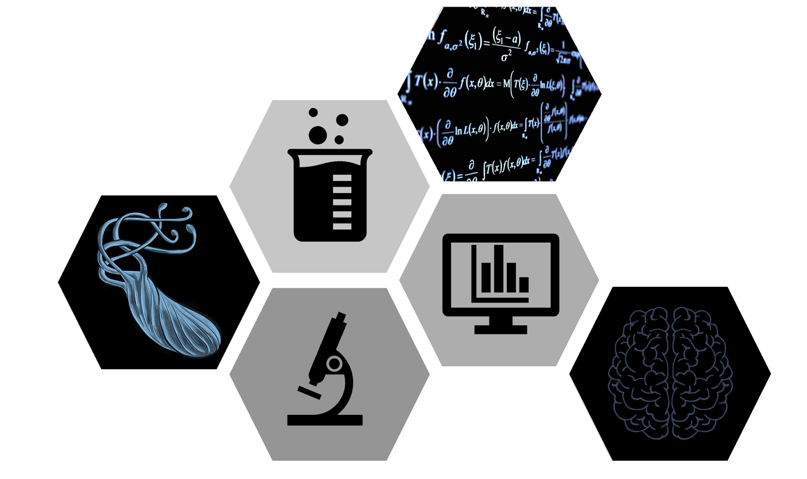Applying Artificial Intelligence to Improve Drug Development

The Nutritional Immunology and Molecular Medicine Laboratory (NIMML) employs Artificial intelligence (AI), referring to intelligence demonstrated by machines, and other advanced computational methods to accelerate the path to cures for complex human diseases. The NIMML was one of the participants in the 2015 workshop of complex science calling for using advanced computational systems to study immune responses. A while paper stemming from that workshop published in Trends in Immunology, highlights the approaches discussed in the meeting, regarding how field of immunology can apply advanced modeling approaches to solve the puzzle of immunity.
Developing a new drug in the U.S. costs about $2.6 billion over the course of 10-15 years. Dr. Bassaganya-Riera, the Director of NIMML delivered a TEDx talk, that highlighted a sideways funnel which illustrated the inefficiency of the drug development process in the U.S. He highlighted the stringency of the process for bringing a drug to market involving discovery, testing in animals and in humans through Phase 1 to 3 clinical trials, and post approval monitoring. “Out of 10,000 drug candidates, only one gets approved by the FDA. The numbers are unbelievable”, he added. “How can we make all this better? Is there a role for AI to improve the efficiency of the drug development process?”, he asked.
Early and successful adopters of advanced technologies such as AI and machine learning (ML), which automates analytical model building, gain efficiencies and advantages that enables them to establish new ground on the market. AI and advanced computational modeling can be used to improve drug development by analyzing data from a wide variety of sources, such as the electronic health records (EHR), clinical trials, genetic records, wearables, bills and insurance claims to predict how a drug might affect every individual. Advanced AI systems can help optimize the design of human clinical trials by testing key clinical trial variables and parameters in silico before actually testing in patients.
NIMMLab used AI-inspired advanced ML technologies to build upon an existing computational model of Clostridium difficile infection. The new advanced computational pipeline, translated preclinical results from animal models into accurate clinical outcomes thereby identifying effective treatment options and predicting optimal doses of drugs. The work published in Artificial Intelligence in Medicine, incorporated mechanistic models with stochastic simulation and advanced ML methods to test and predict the therapeutic efficacy of existing and novel treatments against Clostridium difficile infection. In another study, the NIMML team developed new computational methods to stratify stroke patients in an emergency setting, paving the way to a personalized data-driven triage process with higher fidelity.
“NIMML is leveraging the exponential power of AI and advanced computational approaches to turn biomedical and clinical data into an accelerated path to safer and more effective medicines. These efforts are at the core of a global biotechnology innovation and entrepreneurship BioHealth initiative aimed at transforming medicine and healthcare.” Said Josep Bassaganya-Riera, Director of NIMML and Chairman and CEO of Landos Biopharma.
The researchers at NIMML have created synthetic patient populations of Crohn’s disease and ulcerative colitis patients with the properties of actual patient cohorts, build personalized predictive models of drug combinations and unravel complex relationships between diet, gut microbiome, immune system, and genetic lineup to determine the comparative treatment response in silico before testing in patients. The goal is to use AI-inspired methods to leverage large volume of clinical data from EHRs, completed clinical trials, immunology studies to predict unforeseen insights and develop safer, more effective and cost-efficient drugs.
Related Press Releases
Watch TEDx:Accelerated Path to Cures
Artificial Intelligence: The Next Revolution in Healthcare and Precision Medicine
Modeling and Artificial Intelligence Systems For Accelerating Drug Development
Advancing Precision Medicine: Computational Immunology for Next-Generation Healthcare
Smart Simulations of Phase III Clinical Trials with Synthetic Crohn’s Disease Patients
About NIMML
The NIMML Institute is a 501 (c) (3) non-profit public charity foundation focused on a transdisciplinary, team-science approach to precision medicine at the interface of immunology, inflammation, and metabolism. The NIMML Institute team has led numerous large-scale transdisciplinary projects and is dedicated to solving important societal problems by combining the expertise of immunologists, computational biologists, toxicologists, modelers, translational researchers, and molecular biologists. The Institute is headquartered in Blacksburg, VA. For more information, please visit www.nimml.org or contact pio@nimml.org.
